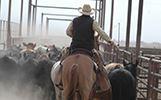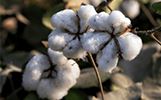| Tell the Consumers About BQA 
BEEF Magazine | October 02, 2017
"Without data you're just another person with an opinion," said W. Edwards Deming, widely considered the godfather of total quality management control — devising ways to increase product quality and consistency while decreasing product failure.
Keith Belk shared this apt quote while introducing the results of the 2016 National Market Cow and Bull Beef Quality Audit.
"Educating packers, retailers, foodservice, and further processing entities about the BQA program could improve marketing weaknesses and public perceptions that plague our industry … utilizing BQA and its principles to increase consumer confidence and enhance industry commitment would encourage greater beef demand, and improve industry harmonization," the report says.
"Carrying this BQA message throughout the industry all the way to consumers would benefit every audience," the report concludes.
Exclusive Aussie Beef Served Up for Chinese Holiday 
Oscar Rousseau, GlobalMeatNews | October 3, 2017
With China's two key Autumn holidays approaching next week one of Beijing's leading meat processors has teamed up with a state–owned retail chain to distribute a range of high end Australian "barbeque beef" cuts.
Formally established in 1999 as a halal–focused processor of beef and lamb, Zhuo Chen also has a "strategic relationship" with the Dutch firm Van Drie Group for the supply of beef genetics and breeding advice. The company claims to breed 100,000 head of cattle and 30,000 sheep per year in its farms in Inner Mongolia, northwest China.
The World's Leaders in Sourcing Sustainable Cotton Has Some Surprises 
Leon Kaye, Triple Pundit (registration) | October 2, 2017
The NGO Solidaridad, in partnership with organizations including WWF and United Kingdom–based Pesticide Action Network, today released its annual sustainable cotton rankings. The survey's researchers considered initiatives that are transforming the apparel industry, such as the Better Cotton Initiative and fair trade certification programs, and also evaluated various companies' policies, sourcing and traceability.
Overall, the report is a warning to the global apparel sector that it still has a long road ahead until it can claim it is environmentally and socially sustainable. But the report also offers some surprises and provides hope that the fast fashion industry can mitigate concerns that its rapid growth will come at too high of a cost to the planet and human rights.
Beef Industry Positives
Erika Murphy, Coyote Creek Angus, Steamboat Pilot & Today | October 9, 2017
I am a rancher who raises Angus cattle for breeding purposes southwest of Steamboat Springs. The beef industry receives lots of negative press at times, so I wanted to focus on some of the positives and offer other perspectives. This only covers a few of the topics, and all figures are from credible sources that I am happy to provide. Cattle are raised in many areas where it is difficult to grow crops. Growing crops is not feasible when the land is too cold, steep, or high as in Routt County. Cattle turn grass that humans cannot eat into meat and milk that we can. Livestock can also eat stocks left after harvest of corn or grain.
WWF Responds to Tim Noakes: Scrutinise the Source and Eat Less Meat
Garreth Van Niekerk, Huffington Post South Africa | October 11, 2017
The World Wide Fund for Nature has responded to claims by Banting diet proponent Tim Noakes that eating more meat is better for the environment. The organisation says the human race faces dire consequences as a result of livestock farming.
"The reality is that global demand for meat and dairy products is growing and there is no getting away from the fact that livestock production has significant environmental impacts," the non–governmental organisation wrote in a statement to HuffPost SA.
BLNZ Project on Impact Of Alternative Proteins
Sally Rae, Otago Daily Times | September 5, 2017
Beef and Lamb New Zealand has begun a project aimed at better understanding what impact alternative proteins may have on the red meat sector.
It is part of the organisation's new innovation programme to front–foot potential challenges and fill knowledge gaps.
Its main purpose was to better understand the shifts in food production technology occurring outside New Zealand, separate "the hype from reality" and provide an objective view on product development, business models and consumer acceptance.
It was also seeking to identify threats and opportunities for New Zealand's red meat sector, as well as shifts and activities the sector might wish to explore to best position itself for the future. | |
